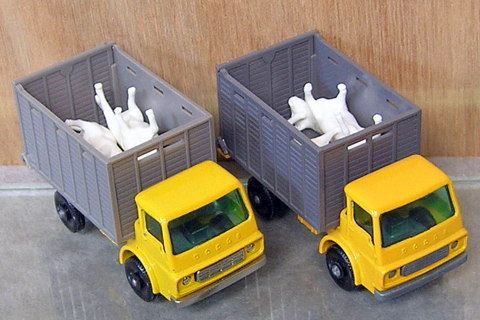The NAMC’s “Catalog of all Series Matchbox Models” (second edition) notes a cab and chassis colour change from dark yellow in the early models to yellow-orange in the later ones. This appears to have occurred from Nick's variation code 5 onwards. Can anyone provide a good comparison photograph so that we can decide whether the inevitable crossover models are worth cataloguing separately?
The AIM's “1-75 Series Regular Wheels” catalogue (second printing, 1983) does not contain any variations not already listed by Nick, and neither does Stannard.
Houghton has two variations with tow guide: variation 37d-5 is listed with a dark grey cattle box, whilst variation 37d-6 has a brown colour. If confirmed, the latter variation would be added to Nick's listed as variation code 7.
U.K. Matchbox did not examine the model .
It should be noted that various catalogues (such as Houghton and U.K. Matchbox) split the even- and uneven-load 37a Coca-Cola Truck into two separate models, thereby making the Dodge Cattle Truck 37d rather than 37c.
37c Dodge Cattle Truck
Re: 37c Dodge Cattle Truck
To be perfectly frank, neither do I! I think it is very hand to determine which colour is which, especially since different catalogues use different names for what is (probably) the same colour.kerbside wrote:Hello Hugh, I do not know if these two colours are what you are asking about.
However, if both the models shown are with tow guide, then that would show that the two guide baseplate was paired with more that one colour of cattle box.
Re: 37c Dodge Cattle Truck
It never made sense to me that such a major casting change on the coke truck (from uneven crates to even crates) would not prompt the model to go to the next sub-series designation.
It might be time to start my "Bucket List."
Re: 37c Dodge Cattle Truck
I agree with you, but I'm sticking to Nick's designations for the purposes of this area.Tinman wrote:It never made sense to me that such a major casting change on the coke truck (from uneven crates to even crates) would not prompt the model to go to the next sub-series designation.
Re: 37c Dodge Cattle Truck
I agree with you Joe, so my Coke trucks are listed as A-B-C in collection.
George T.
George T.
Re: 37c Dodge Cattle Truck
According to my records, we have 3 very different shades of Gray boxes, 2 with brownish gray boxes, and one brown box on our models without the tow guide on their bases. We seem to have only found a single gray shade of box on the base with a tow guide because I only have one of that base cataloged. I do not have that one identified as having a light, medium or dark gray rear body, so I cannot say tonight which shade it may be. Nick seems to have his site done pretty accurately on this Cattle Truck because I can actually fit my models into his Codes. The cabs on these Cattle Trucks do have shade differences in their yellow to orange-yellow paint ratios, but I do not have each of ours named. Why you might ask? 12 variations on a shelf is quite enough of these Cattle Trucks on display for my taste. If I do find other odd colored gray or brown boxes on models with tow guides, I certainly would add a couple more of them to our dozen codes without thought. Kwakers
My opinion was always that the uneven bed Coke Truck was done on a different mold, so I guess I would agree with others here that the earliest Coke Trucks deserved the A code for their uneven loads, the B code for their even loads, leaving the C code for the last Coke Trucks with their black bases. Both our U.S. NAMC and also the AIM catalog recognized these 2 early models as separate codes in the 1970s, but Stannard in 1985 was not to be influenced by their lead and combined them as in Nick's Codes today......kwakers
My opinion was always that the uneven bed Coke Truck was done on a different mold, so I guess I would agree with others here that the earliest Coke Trucks deserved the A code for their uneven loads, the B code for their even loads, leaving the C code for the last Coke Trucks with their black bases. Both our U.S. NAMC and also the AIM catalog recognized these 2 early models as separate codes in the 1970s, but Stannard in 1985 was not to be influenced by their lead and combined them as in Nick's Codes today......kwakers
